Overview
Emergency therapy sessions serve as compassionate interventions aimed at providing immediate support and stabilization for individuals facing acute psychological distress or crises. These sessions are crucial in moments of overwhelming emotions, and they utilize various methods, such as grounding techniques and psychoeducation.
Have you ever felt overwhelmed by your past? These approaches not only assist individuals in coping with their feelings but also help in creating safety plans, fostering resilience, and initiating the healing journey.
As we explore this further, it becomes clear how vital these sessions are in nurturing emotional well-being.
Introduction
Emergency therapy sessions act as a vital lifeline for those facing acute psychological distress, often stemming from traumatic experiences or overwhelming life challenges. These focused interventions not only seek to stabilize emotions but also empower individuals with essential coping strategies to navigate through their crises.
Have you ever felt overwhelmed by your past? Recognizing the signs that indicate the need for such urgent support can be transformative.
What profound impact can these sessions have on mental health recovery? As we explore this further, it becomes clear that seeking help is a courageous step towards healing.
Define Emergency Therapy Session
An emergency therapy session acts as a compassionate intervention aimed at addressing acute psychological distress or crises. Have you ever faced overwhelming emotions, such as panic, anxiety, or even thoughts of self-harm? These feelings can often arise from traumatic events or significant life stressors, and it’s during these challenging times that becomes essential. The primary goal of these sessions is to stabilize individuals, provide immediate assistance, and develop a safety plan to help manage their emotional state.
The methods employed during these sessions can vary greatly based on the individual's urgent needs. They may include:
- Intervention strategies
- Grounding techniques
- Psychoeducation
For instance, a structured single-session crisis intervention model has shown effectiveness in emergency situations, allowing individuals to express their stressors and identify actionable goals. Mental health professionals highlight the importance of these interventions. One specialist notes that recognizing mental health as integral to overall well-being is crucial, while another emphasizes that counseling can significantly enhance coping strategies and emotional resilience.
Real-world examples illustrate the profound impact of emergency interventions. Consider situations where individuals experiencing panic attacks received timely support, leading to reduced distress and a clearer path toward recovery. In times of acute distress, emergency therapy sessions play a vital role in the mental health field, offering essential support and nurturing care. If you or someone you know is struggling, reaching out for help can be the first step toward healing and recovery.
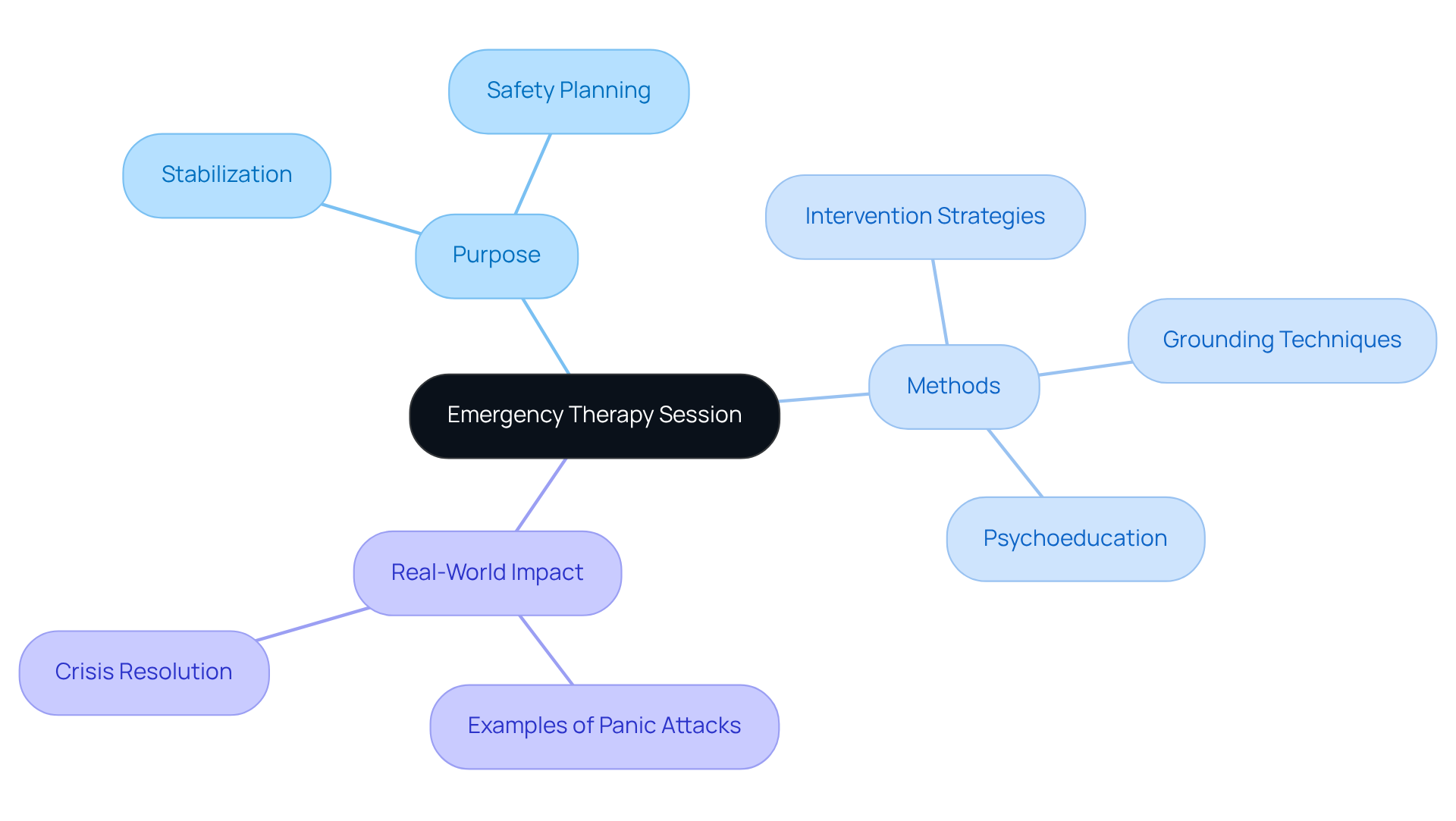
Contextualize the Need for Emergency Therapy
An emergency therapy session is essential in various situations, particularly during acute events like natural disasters, personal loss, or traumatic experiences such as accidents or assaults. Have you ever felt overwhelmed by your past? Individuals often grapple with intense emotions that can lead to a state of crisis, making it challenging to cope with their circumstances. For instance, studies reveal that acute stress disorder (ASD) can affect 20 to 50 percent of those who have faced interpersonal trauma. This highlights the urgent need for therapeutic intervention to mitigate psychological decline.
At The Emerald Couch, we are dedicated to treating trauma and anxiety, offering personalized psychotherapy services that include both in-person counseling and telehealth options. Our therapeutic strategies, such as EMDR and Cognitive Processing Therapy, are designed to address immediate distress while laying the groundwork for long-term recovery. Emergency therapy sessions serve as a crucial resource, equipping individuals with the necessary tools and support to manage their emotional turmoil and begin the healing journey.
We prioritize creating a sense of trust and comfort, ensuring that clients feel safe before delving into any triggering events. This approach not only addresses immediate distress but also fosters resilience in the face of adversity, paving the way for a personalized healing journey. Together, we can , offering a compassionate hand to guide you through.
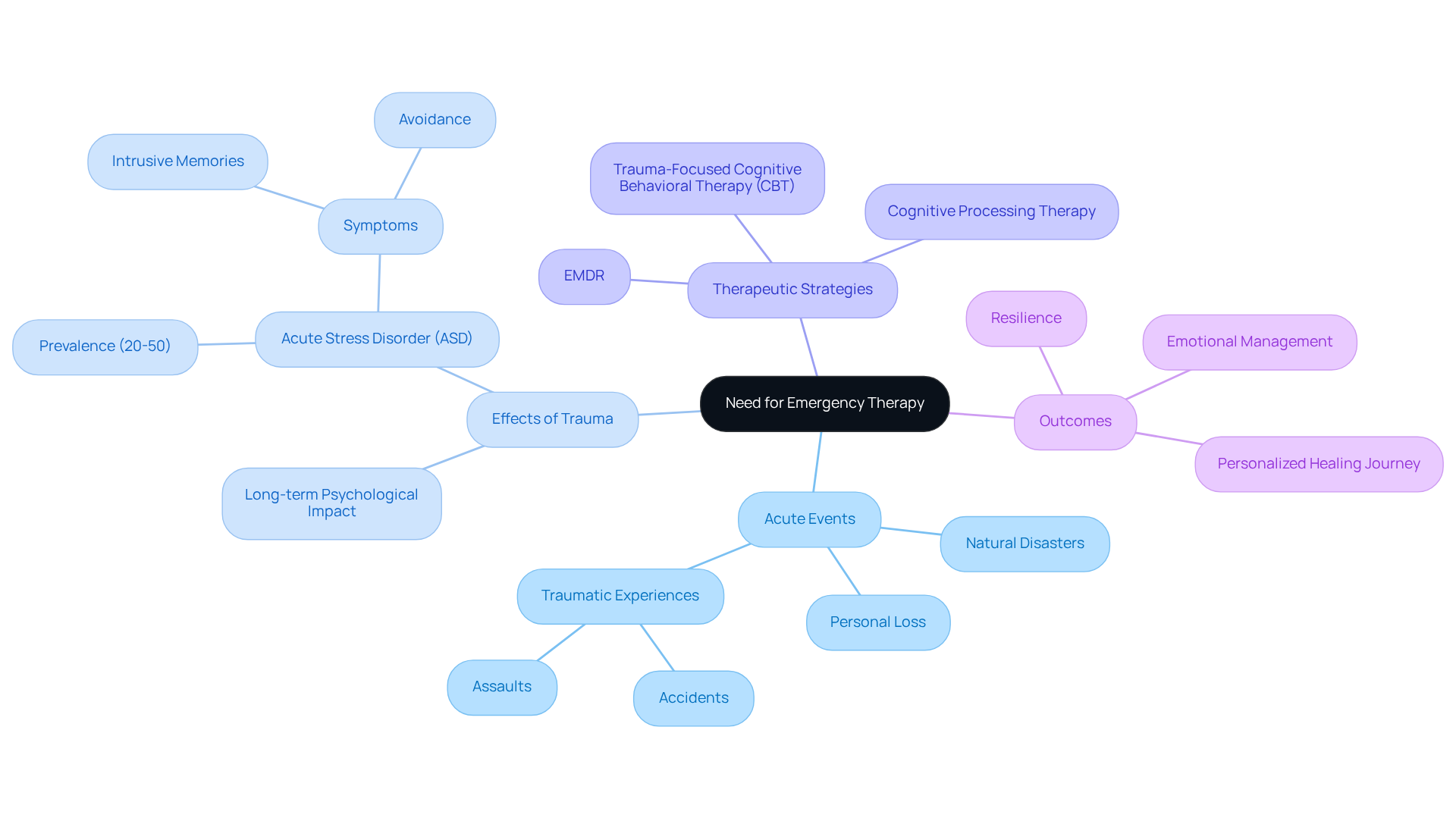
Trace the Origins of Emergency Therapy Sessions
Emergency treatment has its roots in crisis intervention practices that emerged prominently in the mid-20th century, particularly following World War II. Pioneers such as Erich Lindemann and Gerald Caplan recognized the urgent need for psychological support for individuals enduring acute distress. They established principles that emphasized the importance of prompt therapeutic responses to mitigate the effects of trauma. Over the decades, emergency treatment has transformed, embracing various therapeutic modalities, including cognitive-behavioral techniques (CBT) and trauma-informed care. This evolution reflects a deepening understanding of the complex needs of those in crisis, ensuring that therapeutic approaches are both effective and sensitive to the immediate support individuals seek.
Have you ever felt overwhelmed by your responsibilities at work or home? For overachievers, it can often be difficult to prioritize personal needs over external demands. In such moments, an emergency therapy session can provide vital support. If you're feeling anxious, burnt out, or simply overwhelmed, The Emerald Couch provides an emergency therapy session to help you slow down, become more present, and discover solutions that prevent you from burning the candle at both ends. Ultimately, we guide you in within your body, home, and life once again.
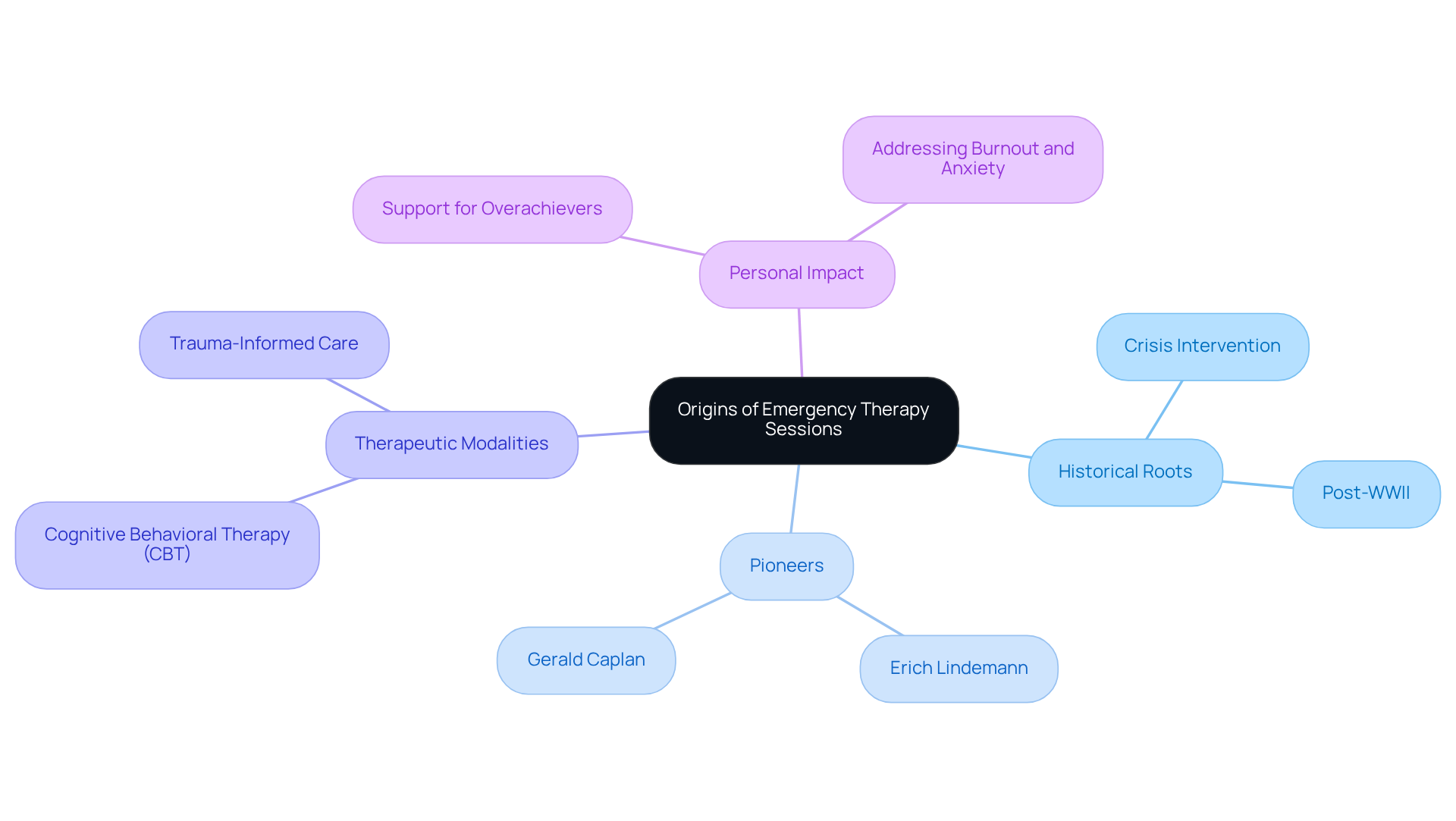
Key Characteristics of Emergency Therapy Sessions
Emergency therapy sessions are characterized by their brevity and focused nature, usually lasting between 30 minutes to an hour. These sessions, specifically the , are designed to swiftly evaluate a person's emotional state and current needs, fostering a safe and supportive atmosphere where clients feel truly listened to and understood.
A vital aspect of this process is the creation of a collaborative safety plan, empowering clients to take an active role in their care. Therapists employ a variety of techniques, such as:
- Grounding exercises
- Cognitive restructuring
- Emotional regulation strategies
to help clients regain a sense of control and stability. Mindfulness practices, including grounding exercises and breath awareness, are often woven into these sessions to enhance emotional regulation and self-awareness.
Have you ever felt overwhelmed by your emotions? Research shows that grounding techniques can significantly reduce anxiety and distress, with studies indicating a remarkable 50% reduction in anxiety levels during acute episodes. The primary goal is to provide immediate relief through an emergency therapy session while equipping clients with coping strategies to manage their distress, fostering resilience and paving the way toward healing.
As one quote beautifully states, 'It’s okay not to be okay. Your feelings are valid,' validating clients' experiences and ensuring they feel acknowledged. By integrating mindfulness practices, therapists at The Emerald Couch can assist clients in finding space between their thoughts and feelings, facilitating a deeper understanding of their emotional responses and enhancing their overall therapeutic experience.
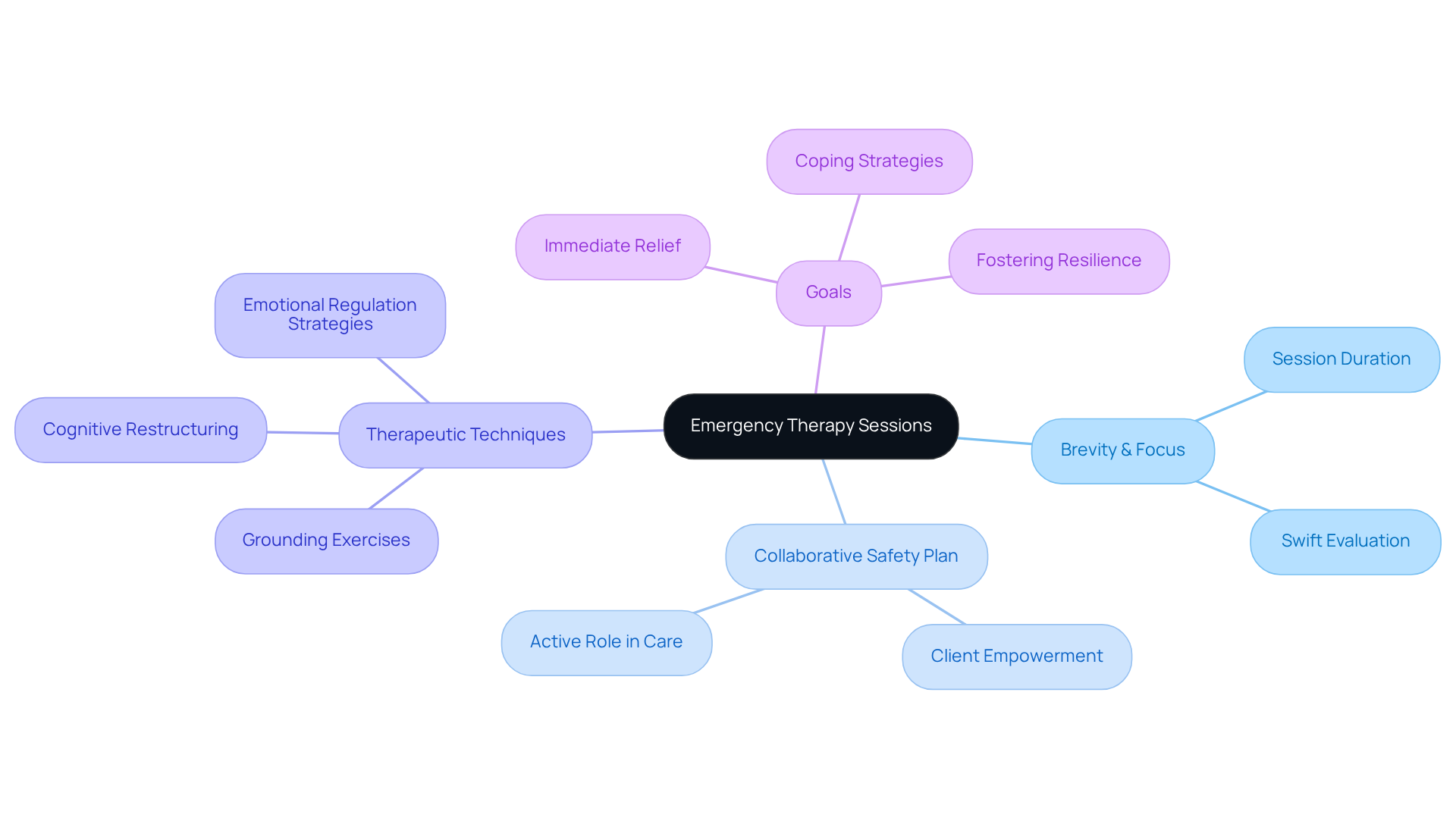
Examples of Situations Requiring Emergency Therapy
Emergency therapy is vital in many situations where individuals experience overwhelming emotional distress. Have you ever felt overwhelmed by your past? For example, someone who has recently gone through a traumatic event, such as a car accident or assault, may seek immediate support to process feelings of shock and anxiety. Similarly, those grappling with sudden loss, like the death of a loved one, often require urgent therapeutic intervention to navigate their grief effectively. This helps mitigate the risk of developing , which can significantly impair daily functioning.
Furthermore, individuals facing severe mental health challenges, including suicidal thoughts or intense panic attacks, need immediate therapeutic support to ensure their safety and well-being. These scenarios highlight the essential role of an emergency therapy session in providing timely support during critical moments. It fosters resilience and facilitates the healing process. At The Emerald Couch, therapists follow a structured process that begins with assessment and personalized treatment planning. This ensures that clients receive the attention and resources necessary for effective healing.
This approach is particularly beneficial for those dealing with trauma and OCD, as it allows for the development of effective coping strategies and greater insight into patterns of thought and behavior. For those in immediate need, resources such as the National Suicide Prevention Lifeline at 988 are available 24/7, providing crucial support during times of crisis. Remember, reaching out for help is a strong and courageous step towards healing.
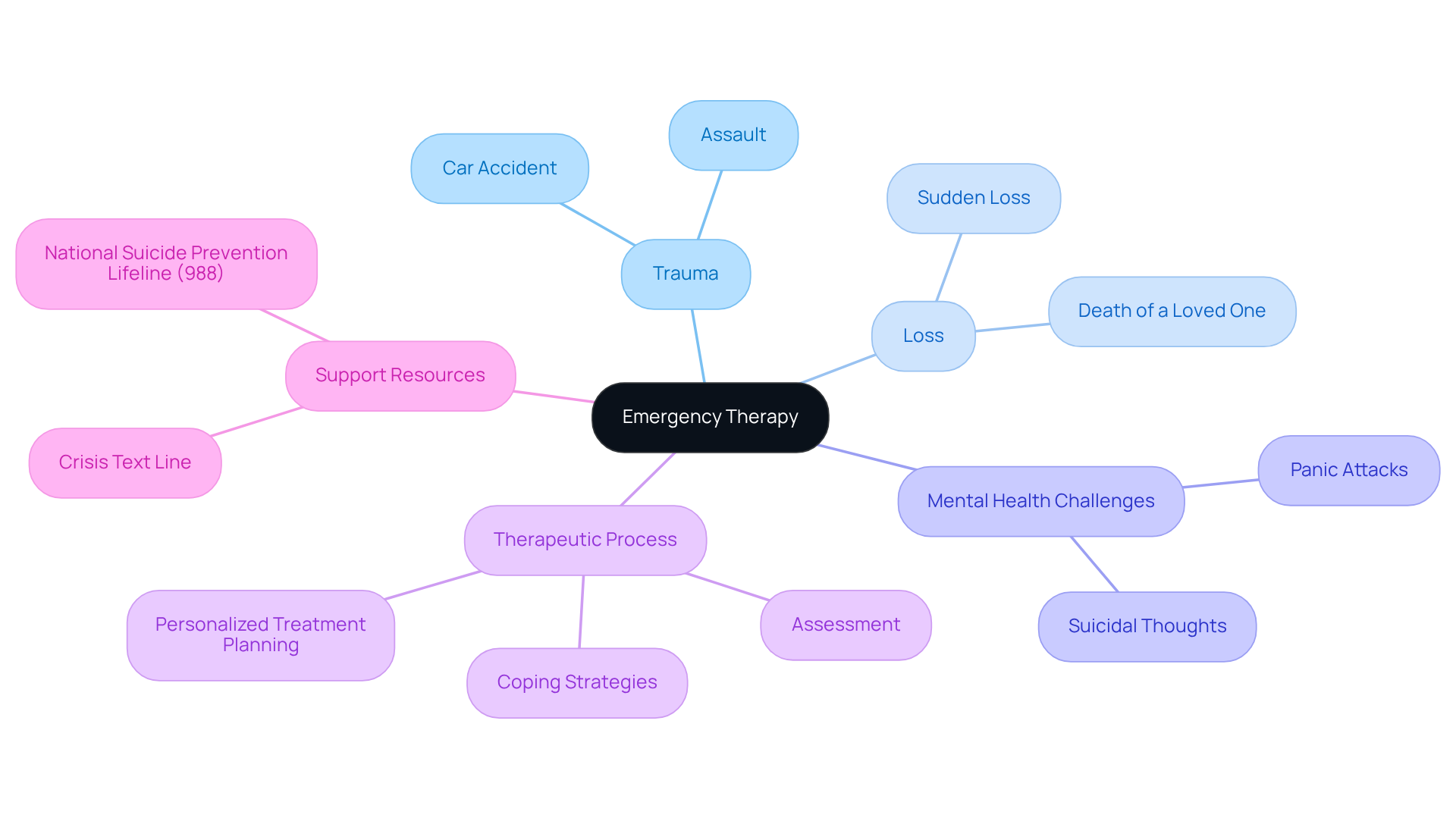
Conclusion
Emergency therapy sessions serve as a critical lifeline for individuals experiencing acute psychological distress, offering immediate support during moments of crisis. These sessions are thoughtfully designed to stabilize emotions, foster resilience, and create actionable safety plans, ensuring that those in need receive the compassionate care essential for their recovery journey.
As we explore this further, various aspects of emergency therapy sessions come to light, including their defining characteristics, historical context, and practical applications. Key insights highlight the importance of targeted interventions, such as grounding techniques and psychoeducation, which play an instrumental role in helping individuals regain control over their emotional states. Real-world examples further illustrate the transformative impact of timely therapeutic support, showing how emergency sessions can significantly alleviate distress and facilitate healing.
In light of the pressing need for mental health resources, especially during crises, it is vital to recognize the role of emergency therapy as an essential component of mental health care. Have you ever felt overwhelmed by your past? Whether facing trauma, loss, or overwhelming anxiety, seeking help is a courageous and necessary step. By understanding the benefits and applications of emergency therapy sessions, individuals can empower themselves and others to navigate their emotional challenges, ultimately paving the way toward recovery and well-being.
Frequently Asked Questions
What is an emergency therapy session?
An emergency therapy session is a compassionate intervention aimed at addressing acute psychological distress or crises, providing immediate assistance and developing a safety plan for individuals experiencing overwhelming emotions.
What types of issues might prompt someone to seek an emergency therapy session?
Issues that may lead to seeking an emergency therapy session include panic, anxiety, thoughts of self-harm, traumatic events, or significant life stressors.
What methods are used during emergency therapy sessions?
Methods used can vary based on individual needs and may include intervention strategies, grounding techniques, and psychoeducation.
How effective are emergency therapy sessions?
Structured single-session crisis intervention models have shown effectiveness in emergency situations, helping individuals express their stressors and identify actionable goals.
Why are emergency therapy sessions important?
They play a vital role in the mental health field by offering essential support and nurturing care during times of acute distress, ultimately aiding in recovery.
In what situations is emergency therapy particularly necessary?
It is essential during acute events like natural disasters, personal loss, or traumatic experiences such as accidents or assaults.
What is the prevalence of acute stress disorder (ASD) in trauma victims?
Studies indicate that 20 to 50 percent of individuals who have faced interpersonal trauma may experience acute stress disorder.
What therapeutic strategies are offered at The Emerald Couch for emergency therapy?
The Emerald Couch offers personalized psychotherapy services, including in-person counseling and telehealth options, utilizing strategies such as EMDR and Cognitive Processing Therapy.
How does The Emerald Couch ensure a safe environment for clients?
They prioritize creating a sense of trust and comfort, ensuring clients feel safe before addressing any triggering events.
What is the ultimate goal of emergency therapy sessions?
The goal is to equip individuals with the necessary tools and support to manage their emotional turmoil and begin the healing journey, fostering resilience in the face of adversity.




